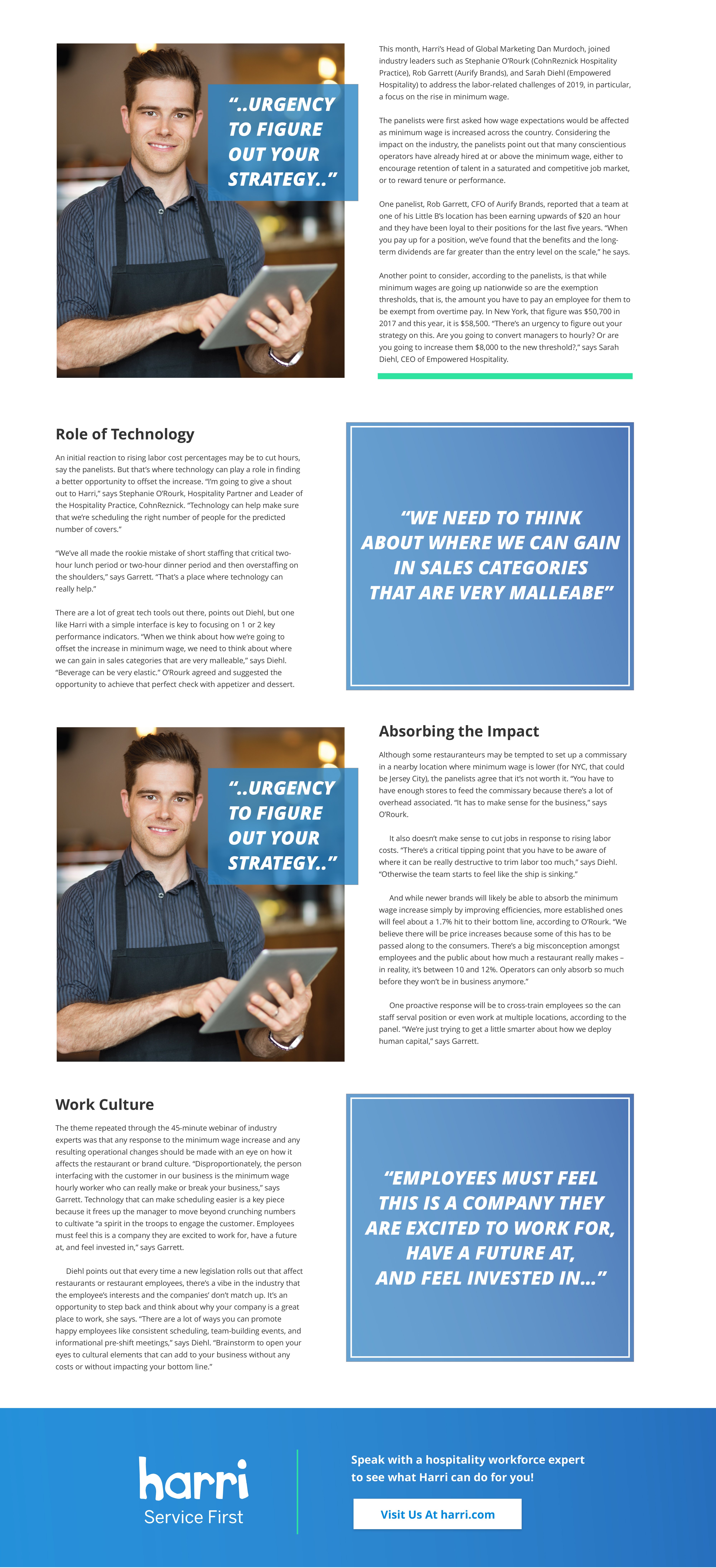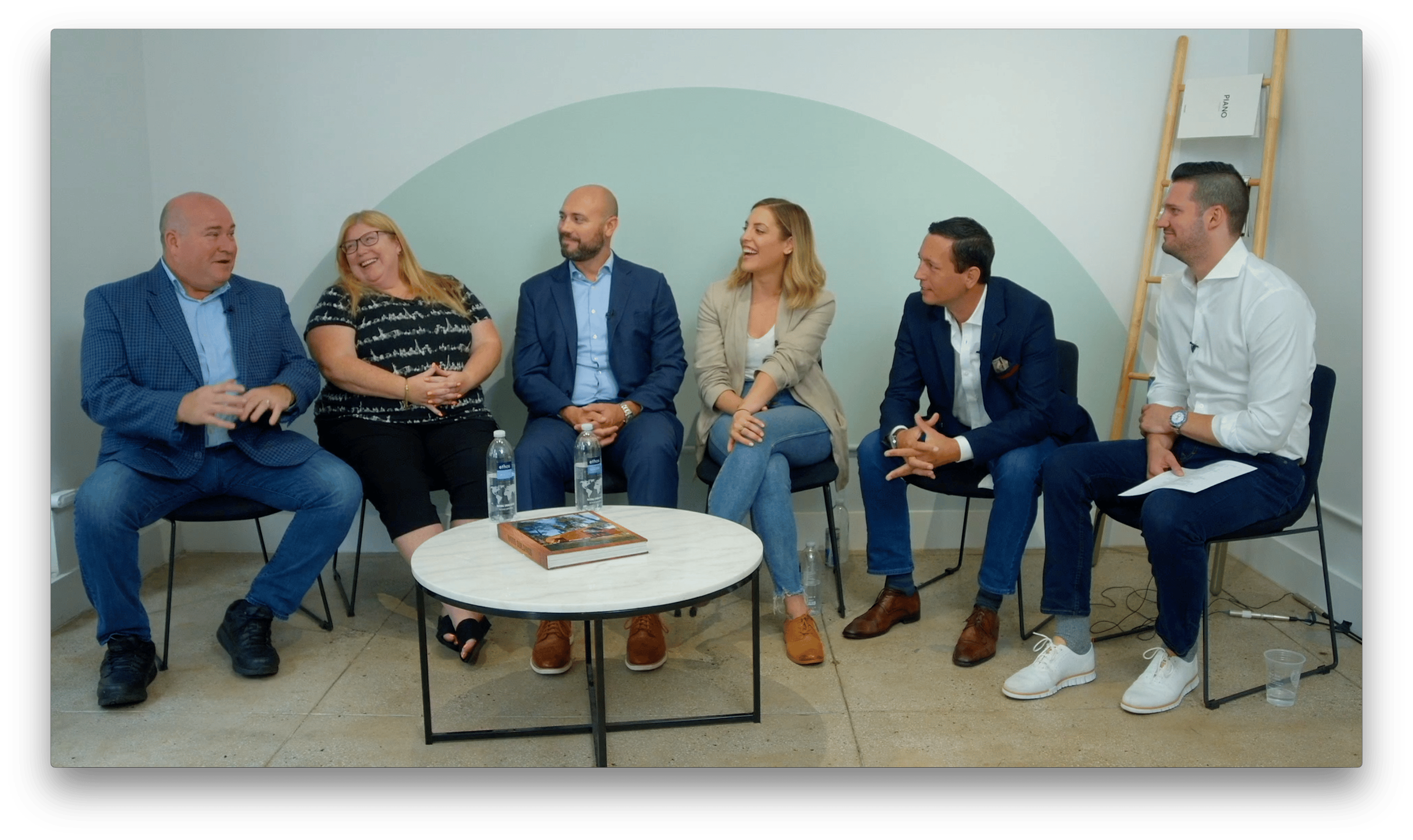
To begin, the panelists discussed why the issue of turnover is so important in the hospitality industry. “Consider that on average, for one $11/hour employee, we're looking at a replacement cost anywhere between $2,000 and $5,000,” says Kilroy. He then added that as the restaurant industry has a low profit margin rate in general, employee turnover should be seen as an opportunity to generate more revenue, more profit or even just to catch up.
Another panelist mentioned that high turnover could be a signal of how operations are going. “I view turnover as a lagging indicator or poor engagement – it’s a metric to ascertain what's going on inside of your business and how to strategize accurately with your people,” says Birkenhead.
Facilitate Reporting
On the other hand, one panelist pointed out that there’s such a thing as good turnover when somebody leaves because they are not right for the brand, position, company or even the industry. “Good turnover is a healthy part of what we do, and we try to address that from day one,” noted McMann-Oliveri, “by selecting and hiring the best people we can -- whether it's working with recruiters or services like Harri. We also focus on onboarding employees properly, and give them the tools and support to do their job.”
In the past, the industry has been hyper-focused on rising minimum wages but the panelists noted that recently, the focus has shifted to celebrating those employees that want to be in their jobs with benefits and a clearly defined career path. “We’re really focusing on things that we want to employ before pre-hire and post-hire that are going to help us actually retain these amazing employees,” said Kilroy.
Another factor affected turnover is that unemployment is very low and people have more options when choosing where they work, Evers noted. McMann-Oliveri pointed out that other industries look at the hospitality world because of all the soft skills that the employees have, which are transferable to many other industries – some of which have higher hourly pay.
“In the fast-casual world, those first 90 days are critical,” explained McMann-Oliveri. “If that orientation day is not great, if they're not engaged, if they're not tasting the food and being a part of the mojo, new hires get bored. They may be motivated to go across the street and get 25 cents an hour more.”
Evers backed up how important those initial three months are on the job. “If we can get a person to celebrate their 91st day at the job, they are nearly 70% more likely to celebrate their one-year anniversary so it's a real opportunity,” he explained.
Measuring Turnover
Pre and Post-Hire Process
At Dig Inn, they recently improved turnover rates by centralizing hiring in the support center with group interviews. “Essentially, our team taught hiring managers how to conduct behavioral interviews but also how to hire for values,” said Birkenhead.
Likewise, McMann-Oliveri mentioned she’s spent a lot of time training managers at Bold on how to conduct interviews to filter out applicants early in the process. She said managers have to be encouraged to ask tough questions like are they legally able to work in the U.S. or can they work nights and weekends. “I think it's really getting your managers comfortable with getting to know people and saying no when it doesn’t look like a good fit,” she explained.
"Good turnover is a healthy part of what we do, and we try to address that from day one..."


"...We’re really focusing on things that we want to employ before pre-hire and post-hire..."




"In the fast-casual world, those first 90 days are critical."
“If we can get a person to celebrate their 91st day at the job, they are nearly 70% more likely to celebrate their one-year anniversary so it's a real opportunity”
State of the Union
This month, Dan Murdoch, Harri’s Head of Global Marketing, led a discussion with industry leaders about the current state of turnover in hospitality. He was joined by Steve Kilroy (The Connell Company), Kaelin Birkenhead (Dig Inn), Jackie McMann-Oliveri (Bold Food), Mike Evers (Harri), and Mike Halen (Bloomberg LP).


Service First

Speak with a hospitality workforce expert to see what Harri can do for you!
LEARN MORE ABOUT HARRI
WATCH THE WEBINAR





WATCH WEBINAR


State of the Industry

When it comes to work culture, panelists agreed it’s better to introduce that culture to the candidate in the application process instead of after they are hired. “Your career page should resemble your culture, use the same buzzwords, and speak the same language,” added McMann-Oliveri. “Include a mission statement, core values, and steps of service, etc.”
Many panelists also noted that there’s a lot more emphasis on finding employees with the right life outlook and mindset – two things that are not trainable. “Attracting people with similar values when it comes to sustainability, the serving of your food, healthier food, better food – it not only attracts customers but also employees that want to be associated with your brand,” said Kilroy.
An Industry in Transition




"It’s important to let them know what they can expect next..."
WEBINAR RECAP
Turnover in the
Hospitality Industry

For Birkenhead at Dig Inn, their critical time period for turnover is half of that. “Our internal number actually shows that if an employee stays with us for that 45th day, they're likely to stay with us for at least one year,” she said.

“In HR, we're so bombarded by all of these administrative tasks,” noted Evers. “Technology, for me, is where the real opportunity lies in taking over some of those tasks, enabling you to truly be a resource for humans in front of you.”
Ultimately, technology is poised to help those in the hospitality industry improve turnover rates. “With tech tools, we're able to look back on our historical information and make better decisions about the future,” said Birkenhead. What’s more, technology can help automate tedious tasks like inventory, freeing up managers to spend more of their time building relationships and engaging with staff.
Role of Technology




"I view turnover as a lagging indicator or poor engagement..."
"Your career page should resemble your culture, use the same buzzwords, and speak the same language"
Other panelists said they’ve seen hospitality companies offer bonuses, paid parental leave, training class on topics like wine, mental health benefits, and even offer employees’ kids a backpack full of school supplies in the fall.
As it’s impossible for most hospitality businesses to offer the highest wages to stay competitive in keeping employees, the panelists suggested thinking outside of the box with what they can offer. “It's so impactful when you sit down with somebody and ask them, ‘Outside of getting money from working here, what do you hope to achieve in general over the next 6, 12, 18 months? Let's write it down. I'll be transparent with you and let you know where we can support you and where we can't and then we can both make a well-informed decision on whether or not we join forces,” said Evers.
More than Money
Another part of early retention, according to the panelists, is maintaining communication so that candidates and new hires don’t feel like they’ve fallen off the radar. “It’s important to let them know what they can expect next, when they can expect to hear from us and ultimately, if it's not a right fit, we always let them know,” said Birkenhead.
To begin, the panelists discussed why the issue of turnover is so important in the hospitality industry. “Consider that on average, for one $11/hour employee, we're looking at a replacement cost anywhere between $2,000 and $5,000,” says Kilroy. He then added that as the restaurant industry has a low profit margin rate in general, employee turnover should be seen as an opportunity to generate more revenue, more profit or even just to catch up.
Another panelist mentioned that high turnover could be a signal of how operations are going. “I view turnover as a lagging indicator or poor engagement – it’s a metric to ascertain what's going on inside of your business and how to strategize accurately with your people,” says Birkenhead.
In the past, the industry has been hyper-focused on rising minimum wages but the panelists noted that recently, the focus has shifted to celebrating those employees that want to be in their jobs with benefits and a clearly defined career path. “We’re really focusing on things that we want to employ before pre-hire and post-hire that are going to help us actually retain these amazing employees,” said Kilroy.
Likewise, McMann-Oliveri mentioned she’s spent a lot of time training managers at Bold on how to conduct interviews to filter out applicants early in the process. She said managers have to be encouraged to ask tough questions like are they legally able to work in the U.S. or can they work nights and weekends. “I think it's really getting your managers comfortable with getting to know people and saying no when it doesn’t look like a good fit,” she explained.
Many panelists also noted that there’s a lot more emphasis on finding employees with the right life outlook and mindset – two things that are not trainable. “Attracting people with similar values when it comes to sustainability, the serving of your food, healthier food, better food – it not only attracts customers but also employees that want to be associated with your brand,” said Kilroy.
When it comes to work culture, panelists agreed it’s better to introduce that culture to the candidate in the application process instead of after they are hired. “Your career page should resemble your culture, use the same buzzwords, and speak the same language,” added McMann-Oliveri. “Include a mission statement, core values, and steps of service, etc.”

"If a post on social media or a video impacts another employee's ability to do their job, then that could be harassment"




"it’s a human right to have a safe and comfortable work environment"
